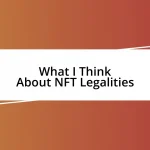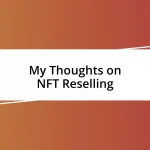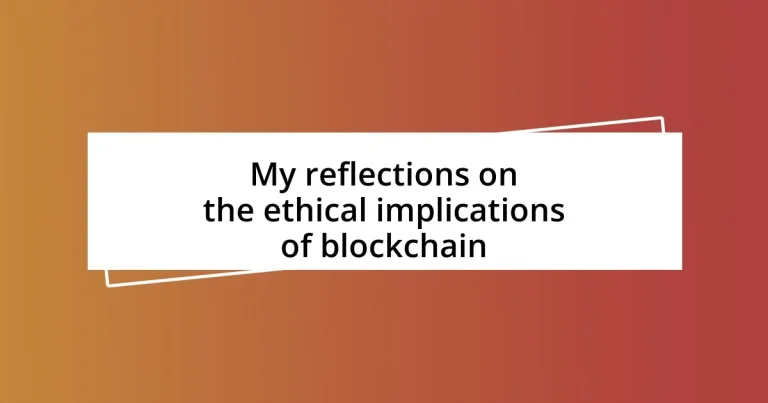Key takeaways:
- Blockchain’s decentralized nature enhances security and transparency but raises ethical concerns about privacy and data permanence.
- The lack of equitable access and the environmental impact of blockchain technology highlight the need for inclusive and sustainable practices.
- Establishing comprehensive regulatory frameworks and fostering collaboration among stakeholders is crucial for ethical blockchain development and usage.
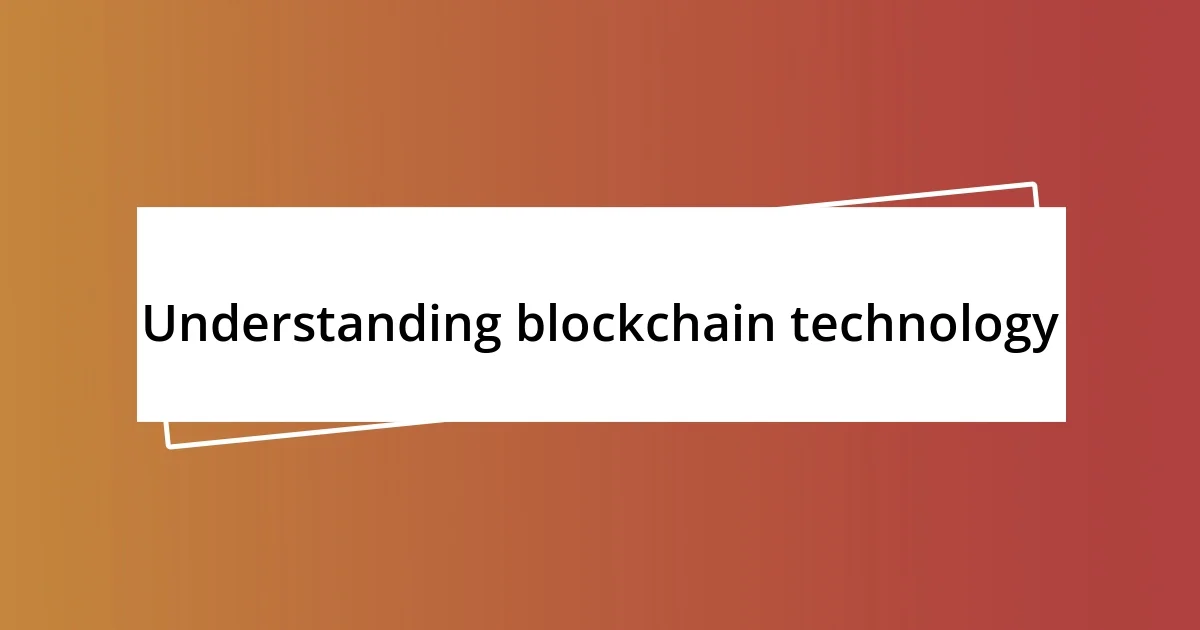
Understanding blockchain technology
Blockchain technology often feels like an enigma, doesn’t it? At its core, it functions as a decentralized ledger that records transactions across multiple computers. This decentralization means that no single entity controls the data, which adds a layer of security that’s quite revolutionary.
I remember the first time I tried to explain blockchain to a friend who was skeptical about its benefits. When I described it as a transparent and tamper-proof record-keeping system, their eyes visibly widened. It’s fascinating to think about how this technology could transform industries by increasing trust and reducing fraud, but it also raises questions about who gets to see what information and how privacy is handled.
As I delve deeper into the concept, I’m often struck by the implications of immutability—once something is recorded on the blockchain, it’s nearly impossible to alter. This permanence can be both reassuring and daunting. How often do we reflect on the long-term consequences of our digital footprints? With blockchain, every transaction leaves a trace, inviting us to consider the ethical ramifications of this technological innovation.
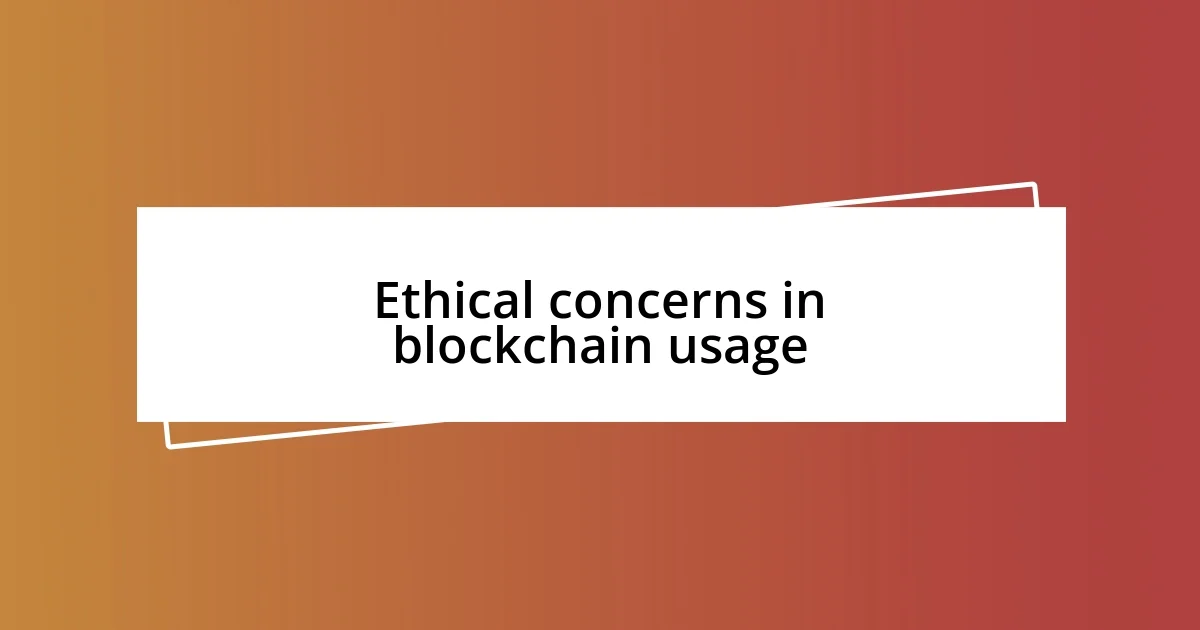
Ethical concerns in blockchain usage
The ethical concerns surrounding blockchain usage are multifaceted. One primary issue is privacy. While blockchain’s transparency promotes trust, it can jeopardize individual privacy. I recall a project I was involved in where we pondered over integrating health records on a blockchain. The idea was revolutionary, but I couldn’t help but feel uneasy about personal data being so accessible, even if it was anonymized. Would patients feel comfortable knowing their information is recorded for eternity, potentially exposing them to unwanted scrutiny?
Another significant concern revolves around equitable access. Blockchain technology offers numerous benefits, but not everyone has the same level of access to the necessary technology or education. I remember reading about individuals in remote areas who lack reliable internet access, yet discussions about blockchain’s transformative potential seem to overlook their plight. As we promote blockchain’s advantages, we must be conscious of inclusivity and ensure that this technology doesn’t deepen societal divides.
Then there’s the environmental impact of blockchain, especially those that rely on energy-intensive mining processes. This often gets overshadowed by the hype surrounding cryptocurrencies. In my own experiences, I’ve felt a growing responsibility to consider the ecological footprint of tech developments. Reflecting on this, I can’t shake the feeling that as we advance, ethical stewardship must guide our decisions to create a sustainable future.
| Ethical Concern | Description |
|---|---|
| Privacy | Blockchain’s transparency can compromise individual privacy, making sensitive data vulnerable. |
| Equitable Access | Access to blockchain technology is unequal; individuals in remote areas often miss out on its benefits. |
| Environmental Impact | Energy-intensive mining processes raise concerns about the ecological footprint of blockchain technology. |
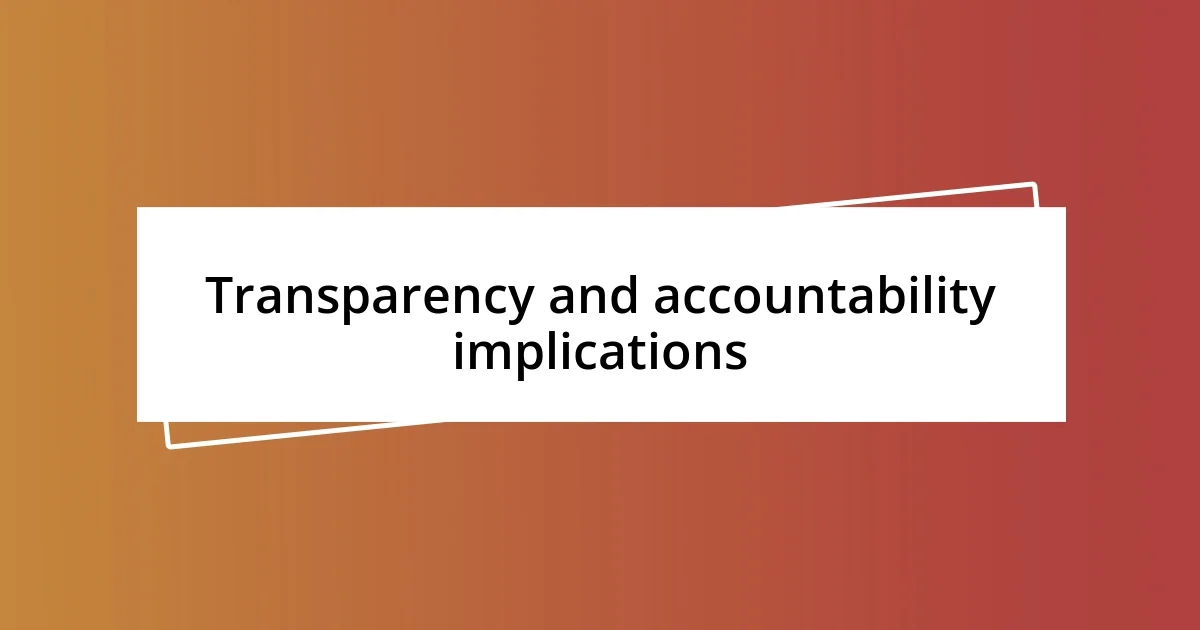
Transparency and accountability implications
The implications of transparency and accountability in blockchain technology are both profound and multifaceted. I’ve often thought about how the inherent transparency of blockchain could revolutionize sectors like supply chain management. For instance, the idea that a consumer can trace a product’s journey from farm to table really struck me one day while grocery shopping. I felt empowered knowing that I could verify the ethical practices behind my food choices. However, I also realized that this level of transparency must come with a sense of responsibility. Organizations must ensure that the information shared is accurate and not manipulated, aligning with genuine accountability.
Consider the following points regarding how transparency impacts accountability within blockchain:
- Immutable Records: Once a transaction is logged, it can’t be changed, creating a clear trail of actions.
- Decentralized Verification: Multiple nodes validate information, reducing the risk of fraudulent activities and enhancing trust.
- Public Access: While this promotes transparency, it also raises concerns about sensitive information, necessitating protocols to protect user privacy.
I sometimes find myself reflecting on whether this transparency could lead to a culture of greater accountability in various industries. It’s thrilling to think that the technology could push companies to act more ethically, yet I can’t ignore the doubts I have about potential misuse or over-exposure of data. On a personal level, as someone passionate about ethical consumerism, the implications of blockchain invigorate my hope for a more honest marketplace, while simultaneously keeping me aware of the risks that come with it.
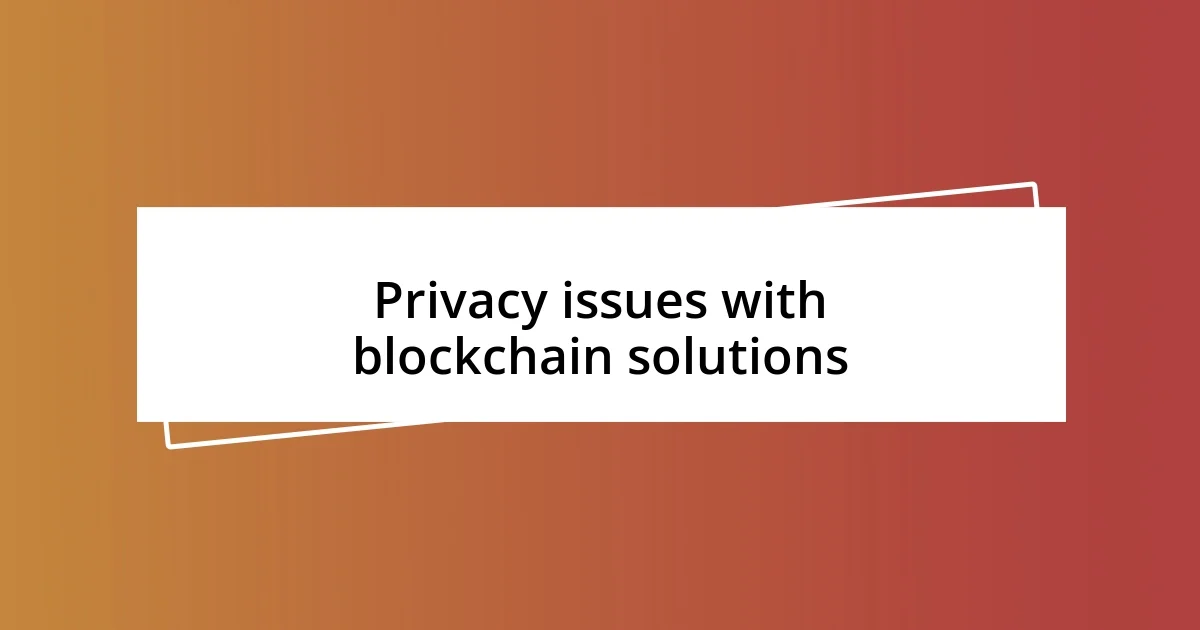
Privacy issues with blockchain solutions
The privacy issues surrounding blockchain solutions are often far more complex than they first appear. While the technology promises secure transactions, I have encountered instances where the permanence of data entry can lead to unintended consequences. For example, I once volunteered with an organization that considered using blockchain for voter registration. While the idea was to enhance security, I couldn’t shake the apprehension that stored information might outlive the wishes of individuals who preferred their voting history to remain private. How can we balance security with the fundamental human right to choose what information about ourselves is shared?
Moreover, I think about the so-called “pseudonymity” of blockchain. I’ve come across articles emphasizing that users can have blockchain identities without revealing personal details. But here’s the catch: once you link a blockchain address to any aspect of your real identity—say, an online purchase or a social media account—it can become an open book. I remember discussing this with a friend who works in cybersecurity; he argued passionately that this known vulnerability could create dire repercussions, particularly for activists and whistleblowers. Is it worth sacrificing privacy for the sake of transparency?
Finally, there’s the risk of data leakage through smart contracts. I recall a case study where a financial institution implemented smart contracts for transactions, excited about their efficiency. However, during our discussions, someone raised a very valid point: what if sensitive information gets exposed due to a programming flaw or a hack? The implications left us all uneasy—would companies be legally responsible for data breaches that arise from using these ostensibly secure digital contracts? That uncertainty lingers in my mind, reinforcing that while blockchain can enhance many aspects of our lives, we must tread carefully, especially when it comes to safeguarding privacy.
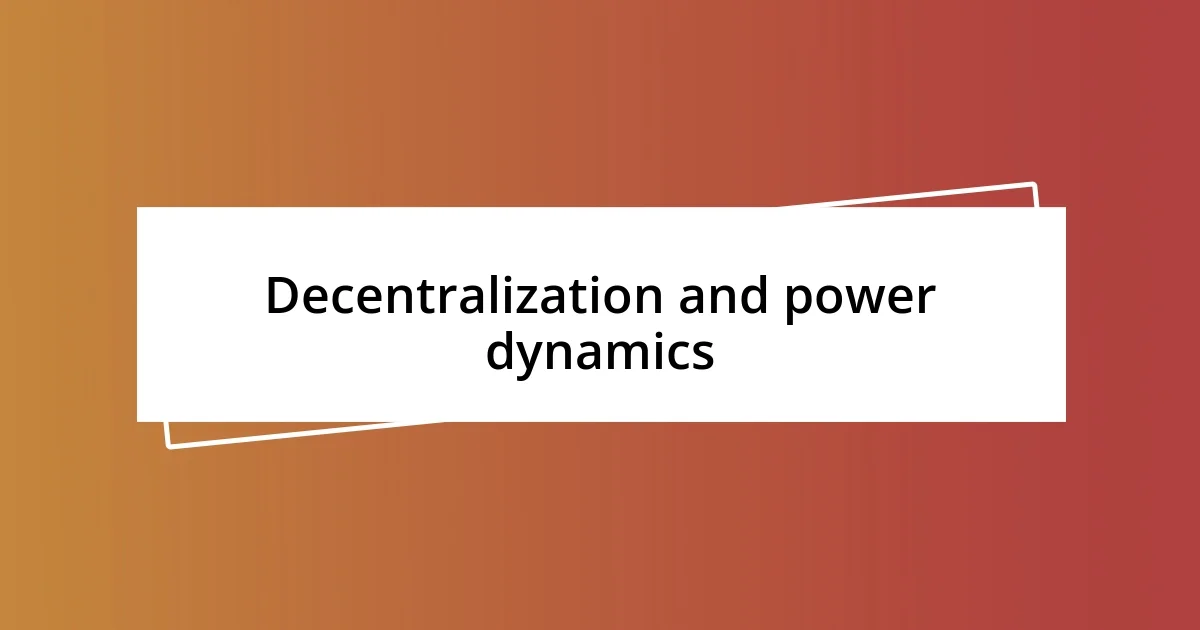
Decentralization and power dynamics
When I delve into the topic of decentralization in blockchain, I can’t help but consider its impact on power dynamics. The idea that power can shift from centralized authorities to individuals is both exciting and daunting. For instance, I once attended a community meeting discussing the potential for blockchain to empower local economies. The energy in the room was palpable, yet I wrestled with the thought of how this newfound power could lead to conflicts among individuals who may not share the same ethical values. What does it mean for society when the chains of control dissolve, but the risk of chaos emerges?
I find myself reflecting on how decentralization can democratize access to resources, yet it also raises questions about accountability. For every empowering narrative I hear—like a startup successfully bypassing traditional banking—there’s a sobering tale about scams exploiting the lack of regulation in decentralized systems. I remember my skepticism when a friend enthusiastically invested in a new blockchain project, convinced it would disrupt the financial sector. When I queried him about safety and ethics, he dismissed my concerns. Isn’t it crucial for us to pause and consider how decentralization, while liberating, can leave the vulnerable exposed to exploitation?
Moreover, the new power dynamics challenge existing hierarchies in ways that are both liberating and unsettling. In a recent casual chat with a colleague who’s been diving deep into cryptocurrency, we pondered whether decentralization truly empowers the “little guy” or merely replaces established institutions with new elites. I shared my concern about the rise of influencer-led projects that often prioritize profit over ethical considerations. It left me contemplating—are we really distributing power, or are we just redistributing it within a new framework that could still lead to inequality? This ongoing dialogue reinforces the reality that while blockchain holds transformational potential, it calls for a careful examination of what decentralization truly represents.
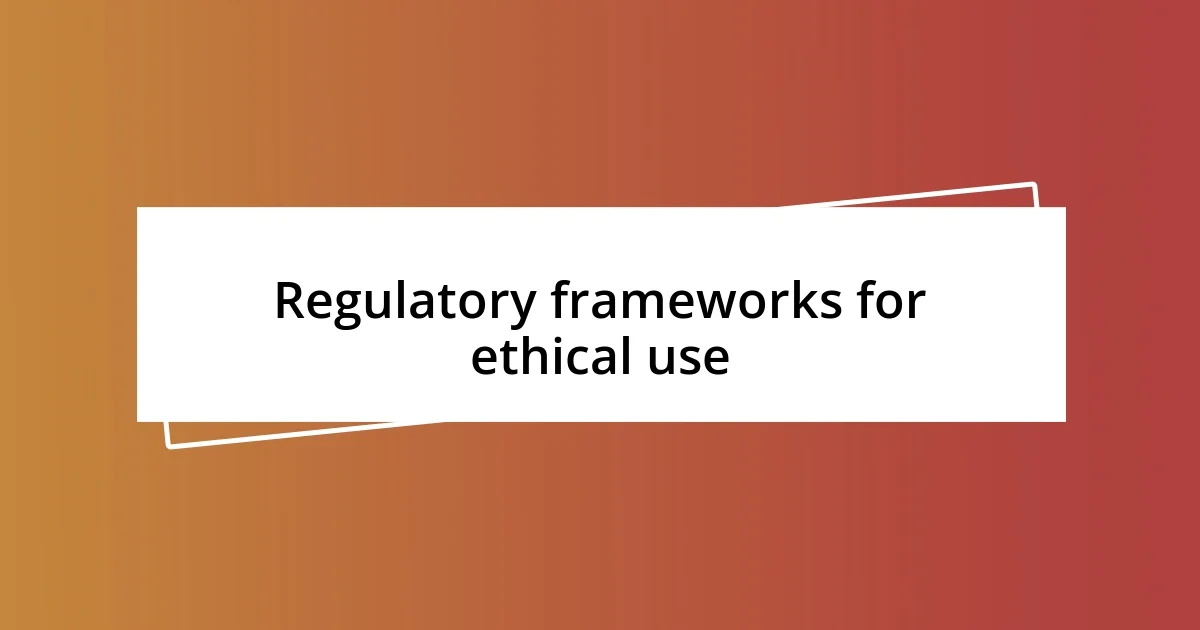
Regulatory frameworks for ethical use
Regulatory frameworks are essential in ensuring that blockchain technology is employed ethically. I once participated in a focus group discussing the implications of creating regulations around blockchain startups. There was a palpable tension as we debated whether strict regulations would stifle innovation or protect consumers from potential fraud. How can we construct a regulatory environment that nurtures creativity while safeguarding ethical standards? This balance is not just desirable; it’s necessary for the sustainable growth of blockchain applications.
In my experience, the lack of comprehensive regulations often leads to inconsistencies in how blockchain is used across different sectors. I remember a workshop where various professionals shared their approaches to implementing blockchain in finance and healthcare, revealing a chaotic spectrum of practices. Without a unified regulatory framework, businesses may adopt unethical practices, taking advantage of the ambiguity. Doesn’t it feel daunting to think that the very technology that promises transparency could also be manipulated in the absence of ethical guidelines?
It’s crucial to look beyond simple compliance when setting regulatory standards. I’ve seen firsthand how regulations tailored for blockchain can encourage responsible development and foster public trust. In a recent discussion with a small tech startup about their blockchain initiative, we explored the idea of self-regulation within a broader oversight framework. They expressed concern that rigid regulations might hinder their innovative spirit. But I argued that ethical guidelines could serve as a compass, guiding not just compliance but also inspiring fair practices. What would it take for us to see regulations not as constraints but as building blocks for a more ethical blockchain landscape?
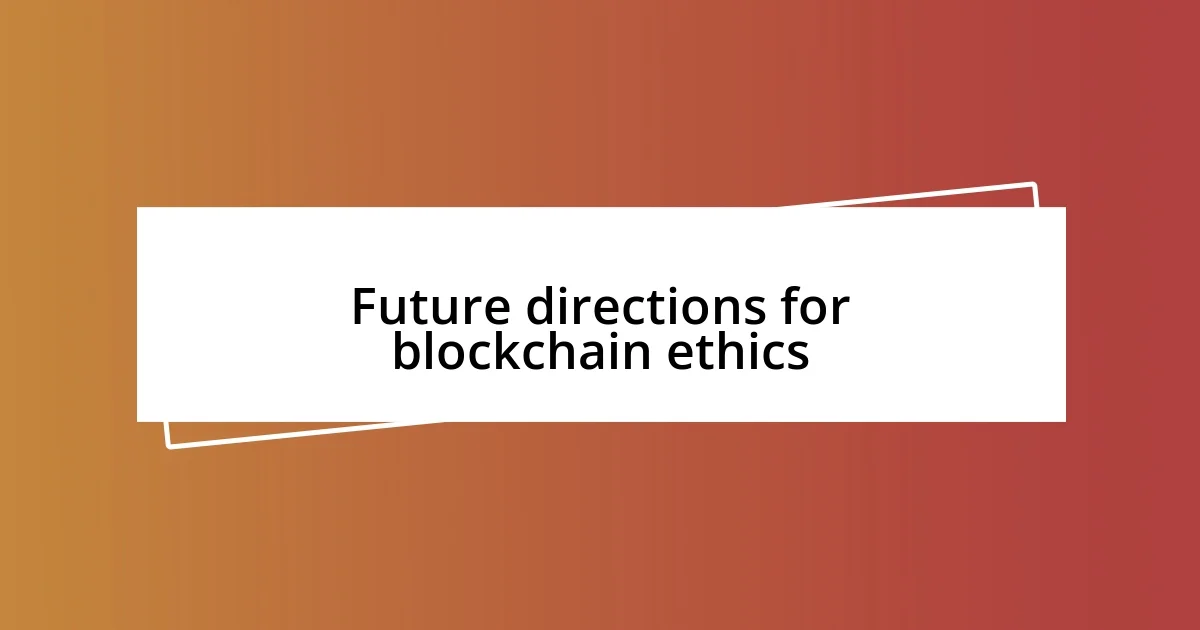
Future directions for blockchain ethics
As I consider the future of blockchain ethics, one clear direction stands out: the need for more collaborative approaches among stakeholders. During a recent workshop, I spoke with developers, investors, and ethicists who all voiced a similar concern: without a shared vision for ethical standards, we risk creating a fragmented ecosystem. I couldn’t help but wonder, how can we ensure that diverse voices come together to shape thoughtful practices in blockchain? I believe that fostering this collaboration is essential to developing a robust ethical framework.
Another important aspect for the future lies in education and awareness. Reflecting on my own journey, I recall my initial misconceptions about blockchain technology, thinking it was just a trend. I now see how critical it is for users, developers, and policymakers to fully understand the ethical implications of their choices. Shouldn’t we prioritize educating all stakeholders about the potential risks and benefits of blockchain? This could lead to more responsible participation in the space and a richer dialogue about ethical behaviors.
Furthermore, I see a growing necessity for technological solutions that enhance transparency and accountability. In a conversation with a friend who’s been deeply involved in blockchain audits, he emphasized how vital it is to leverage tech for better practices. It struck me that while blockchain is often celebrated for its transparency, the systems built on top of it sometimes lack it entirely. Shouldn’t we be striving to develop tools that not only promote ethical usage but also actively combat exploitation? I believe that an emphasis on creating such solutions could reshape the landscape, ensuring that the technology aligns with ethical values.





